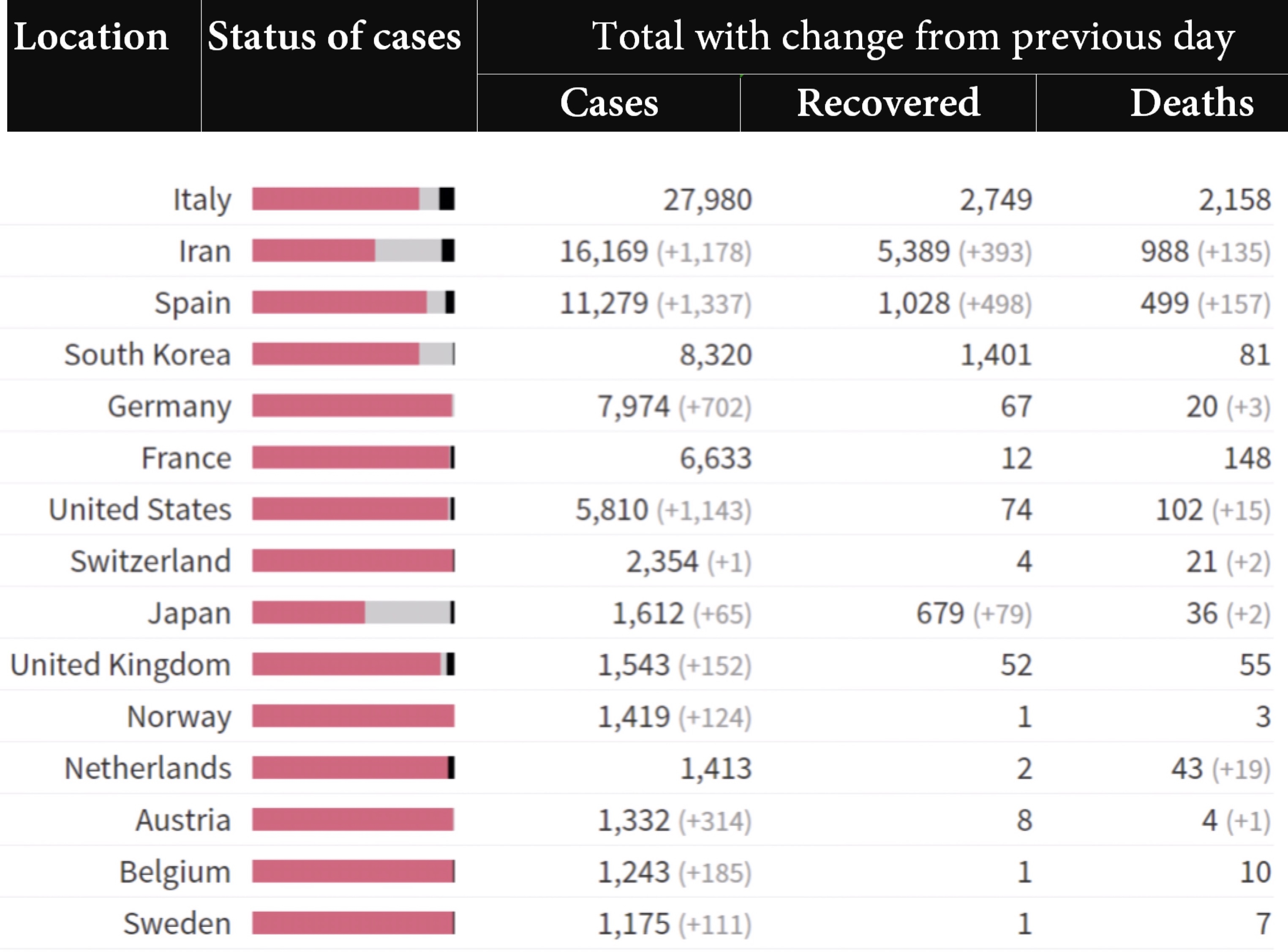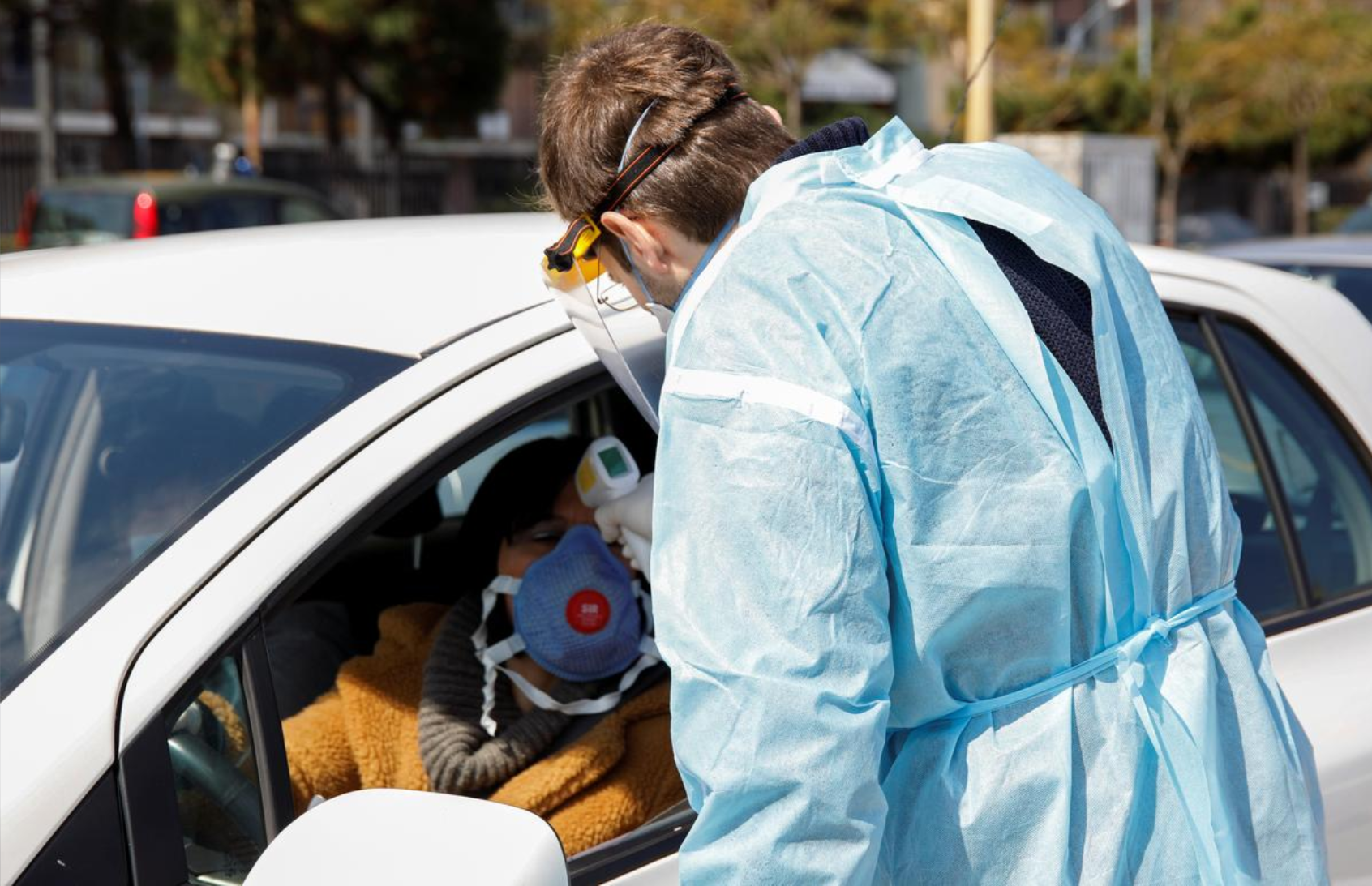Editor's note: This is the sixteenth article in the COVID-19 Global Roundup series. Here is the previous one.
Around the world, bad news was relentless.
With the highly contagious respiratory disease racing across the world to infect more than 196,000 people so far, governments on every continent have implemented draconian containment measures from halting travel to stopping sporting events and religious gatherings.
While the main aim is to avoid deaths – currently at over 7,800 – global powers were also focusing on how to limit the inevitably devastating economic impact.

Data of countries with more than 1,000 confirmed cases around the world. /Reuters
Data of countries with more than 1,000 confirmed cases around the world. /Reuters
The U.S.:
In the world's biggest economy, U.S. President Donald Trump's administration has proposed pumping one trillion U.S. dollars into the market. Trump wants to send cash to Americans within two weeks as the respiratory illness reported in all 50 U.S. states and the total number of infections surging past 6,400, with the death toll approached 100.
After initially playing down the threat and focusing on the stock market, the Republican president's tone on the pandemic has changed sharply in the last few days. His administration has begun pushing for urgent action to stem the disease's economic and human toll.
Aside from the one trillion U.S. dollars, the Trump administration is also considering a plan to send checks to individual Americans of 1,000 U.S. dollars to help them weather the crisis. High earners might not qualify for payments, which could be sent within the next two weeks, Treasury Secretary Steven Mnuchin said.
Italy:
Italy on Monday adopted an emergency decree worth 25 billion euros to soften the blow to an economy virtually brought to a halt by draconian measures put in place last week to try to stem the contagion by locking down the whole country.
Among a raft of measures, the decree suspends loan and mortgage repayments for companies and families thanks to state guarantees for banks, and increases funds to help firms pay workers temporarily laid off due to the lock-down.
The decree is immediately effective and provides 3.9 billion euros to help the hard-pressed health service and 10 billion to support families and workers.
It also extends parental leave, offers funds to families to pay for babysitters, and suspends all firing procedures begun after February 23.
Prime Minister Giuseppe Conte said the package was not enough to deal with the crisis and it was already working on new measures, which the economy minister said would be approved next month.

A medical worker checks the body temperature of a car driver after their arrival at a ferry port in the Sicilian city of Messina, Italy, March 16, 2020. /Reuters
A medical worker checks the body temperature of a car driver after their arrival at a ferry port in the Sicilian city of Messina, Italy, March 16, 2020. /Reuters
Spain:
Spain announced a 200 billion euros package on Tuesday to help companies and protect workers and other vulnerable groups affected by the spiraling coronavirus crisis.
The economic assistance measures in addition to the 14 billion euros announced last week, representing 20 percent of Spain's annual economic output, are state-backed credit guarantees for companies, and the rest include loans and aid for vulnerable people.Some 117 billion euros will be mobilized by the state, with the rest to come from private companies.
Prime Minister Pedro Sanchez announced that 100 billion euros will be made available to businesses in the form of public guarantees. Meanwhile, workers and self-employed workers will be able to receive unemployment benefits and companies will not have to pay taxes for employees who have been temporarily made redundant.
Those who become unemployed or lose their regular income will be able to postpone their monthly mortgage payments as well as their utility bills. Companies will not be able to take measures against employees who can't show up for work because they need to look after children or the elderly.
Spain is the European country hardest hit by the virus after Italy and is in the second day of a lockdown.
More than half of jobs in Spain are dependent on small or medium-sized companies. So far, some 100,000 people have been estimated to have been made temporarily redundant, especially in highly sensitive sectors such as retail, manufacturing and hospitality.

Spanish Prime Minister Pedro Sanchez presides over cabinet meeting with some of its members by video-conference at the Moncloa Palace in Madrid, Spain, March 17, 2020. /Reuters
Spanish Prime Minister Pedro Sanchez presides over cabinet meeting with some of its members by video-conference at the Moncloa Palace in Madrid, Spain, March 17, 2020. /Reuters
The UK:
In Boris Johnson's first daily update on Monday he acknowledged the economy was facing "a severe blow" because of the virus as the new Chancellor Rishi Sunak prepares to unveil new plans to help the economy.
The expected economic announcement comes less than a week after Sunak published his budget, which included 12 billion euros specifically targeted at coronavirus measures to get the country through the outbreak. Experts say the 12-billion-euro plan now looks potentially inadequate in the light of the way the crisis had developed.
Help for the airline industry, which has been crippled by travel bans and a collapse in demand, is expected to be among the new measures.
The number of people who have died with the virus in the UK has reached 55. More than 1,500 people have tested positive for the virus in the UK, but the actual number of cases is estimated to be between 35,000 and 50,000.
France:
French Finance Minister Bruno Le Maire on Tuesday announced a 45 billion euros aid package for small businesses and other hard-hit sectors of the economy. More than 3.5 million businesses could be impacted by confinement measures announced Monday, which suspended many economic activities in the country.
The 45-billion-euro stimulus will mainly take the form of reduced social security contributions for an amount of 35 billion euros, which the state could partly claw back later. Unemployment benefits linked to forced part-time employment will cost the government 8.5 billion euros, while a solidarity fund for the self-employed and shopkeepers will require at least 2 billion euros.
Le Maire said the French government is expecting a one percent drop in gross domestic product and a recession in 2020. As for public debt, it will exceed 100 percent of GDP this year.
French President Emmanuel Macron also announced Monday evening that the government would postpone reforms of the unemployment insurance and pension systems, a move which will also cut the French state off from new revenues.

An empty subway train is seen during the outbreak of the coronavirus in New York City, U.S., March 17, 2020. /Reuters
An empty subway train is seen during the outbreak of the coronavirus in New York City, U.S., March 17, 2020. /Reuters
Canada:
As the Canadian government continues to respond to the novel coronavirus outbreak, a new stimulus package set to be unveiled Wednesday will include expansions on employment insurance.
The economic package, which is expected to be worth between 20 and 30 billion Canadian dollars(14-21 billion U.S. dollars), will be presented by Finance Minister Bill Morneau.
The package will increase payments for people eligible for unemployment insurance and child benefits, and will push back deadlines for filing taxes. The deadline for filing income tax returns for individuals and businesses will be extended by one month to June 1 and July 31, respectively.
However, Ottawa was not yet ready to unveil support for major airlines such as Air Canada and WestJet.
The economic measures came amid the prime minister's announcement on Monday to close the Canadian borders to most foreign nationals except for Americans, Canadian citizens and permanent residents.
Ontario on Tuesday declared a state of emergency, banned gatherings of more than 50 people and ordered the closure of bars and restaurants. Ontario Premier Doug Ford committed 300 million Canada dollars (211 U.S. dollars) to boost the healthcare system. British Columbia and Alberta were also among the provinces that declared states of emergency.
To date, the death toll in Canada doubled to eight with three more deaths in British Columbia (B.C.) and the first in Ontario. There have been nearly 600 infections nationwide.